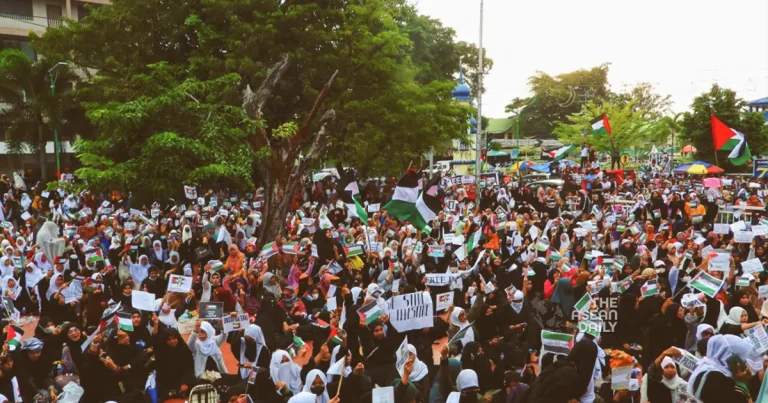10-11-2023 (JAKARTA) The protracted conflict in Gaza is fueling growing hostility towards the United States among Muslim populations in Southeast Asia, particularly in Malaysia and Indonesia, due to Washington’s unwavering support for Israel. Analysts are raising concerns about whether governments in the region, with Muslim majorities, will face pressure to cater to public sentiment and demonstrate a slowdown in efforts to strengthen ties with the US.
While Southeast Asian countries seek stronger economic relations with China, they have also pursued closer connections with the US to balance China’s influence in the region. However, the US has never been wholeheartedly embraced in the region, according to Professor Joseph Liow from Nanyang Technological University. He attributes this sentiment to events of the past two decades, including America’s military campaigns in Afghanistan and Iraq following the September 11, 2001 terrorist attacks.
The memory of these events remains fresh in the minds of many Malaysians and Indonesians, which could complicate the leaders’ positions as they navigate the current situation. Moreover, the political landscape today is more challenging than it was 20 years ago, adding further complexity to the issue.
Prime Minister Anwar Ibrahim of Malaysia, who is grappling with decreasing support from the Malay Muslim majority, has felt compelled to adopt a more forceful stance on the Gaza conflict. He criticized the presence of American troops in the Middle East and accused the US of enabling Israel’s actions. However, for now, it seems that the Malaysian government’s rhetoric is mostly influenced by pressure from the Malay Muslim nationalist opposition.
Indonesia, while also expressing solidarity with Palestinians and citing Israeli occupation as the root cause of the conflict, has employed less confrontational language. President Joko Widodo has called for a resolution based on United Nations parameters.
Despite the public sentiment, there have been no significant policy changes in either country as the conflict in Gaza enters its second month, resulting in a high Palestinian death toll. However, some consumers in Malaysia and Indonesia have organized boycotts against companies and products, often mistakenly associated with Israel or the US.
These boycotts have garnered organic support, leading to a decline in footfall at certain American restaurant chains. The Indonesian government, however, has distanced itself from these initiatives, emphasizing its focus on policies that support industry productivity and competitiveness.

Both Anwar Ibrahim and President Joko Widodo are expected to raise the Gaza issue during the Asia-Pacific Economic Cooperation Economic Leaders’ Week 2023 in the US. President Widodo, who secured a bilateral meeting with President Joe Biden, is anticipated to urge his counterpart to broker a ceasefire between Israel and Hamas.
While the Biden administration remains firmly supportive of Israel, there are divisions within Congress and the State Department regarding this stance. Some State Department staff have internally criticized the administration’s handling of the conflict, suggesting that the US should publicly criticize Israel.
This growing pressure to rein in Israel is not limited to Muslim societies within the US but extends to Southeast Asia, where failing to address the Palestinian plight could complicate cooperation between governments and the US.
However, despite potential backlash and resentment towards the US, particularly in Malaysia and parts of Indonesia, the long-term impact on US relations with Southeast Asian countries is expected to be limited. Elites in both countries, especially in Indonesia, desire positive relations with the US while maintaining a balanced approach to the Israel-Palestine question.
Concerns have been raised that the refusal of Muslim leaders in the region to condemn Hamas could fuel militancy, given the history of Southeast Asian individuals joining jihadist groups abroad. The ongoing conflict in Gaza may serve as a catalyst for the revitalization of terror networks and increased radicalization in Southeast Asia.
To mitigate this, the US has introduced the Hamas International Financing Prevention Bill, which aims to impose sanctions on foreign support for Hamas and the Palestinian Islamic Jihad. However, this bill still requires approval from the Senate and President Biden. In Malaysia, Mr. Anwar has stated that unilateral sanctions will not be recognized, as they could impact trade and investment ties with the US.
While Malaysia’s political leader is conscious of public sentiment, foreign policy changes are influenced by various factors and can be unpredictable. It is feared that the Malaysian government’s refusal to distance itself from Hamas could complicate its relationship with the US.
Furthermore, Mr. Anwar’s warming ties with China, resulting in significant trade and investment deals, may contribute to his need to maintain distance from the US publicly. It is crucial for him to assuage public sentiments, particularly among Muslim-majority voters, as he navigates his first term as Prime Minister.
The escalating conflict in Gaza is exacerbating antipathy towards the United States among Muslim populations in Southeast Asia. Governments in the region, particularly in Malaysia and Indonesia, may face pressure to demonstrate a slowdown in efforts to strengthen ties with the US. While the long-term impact on US relations in Southeast Asia is expected to be limited, the refusal of Muslim leaders to condemn Hamas could lead to increased militancy and radicalization. Moreover, potential backlash and resentment towards the US could complicate cooperation between governments and the US in the region. It remains to be seen how the conflict in Gaza and its implications will shape the dynamics between Southeast Asia and the United States in the coming months and years.




